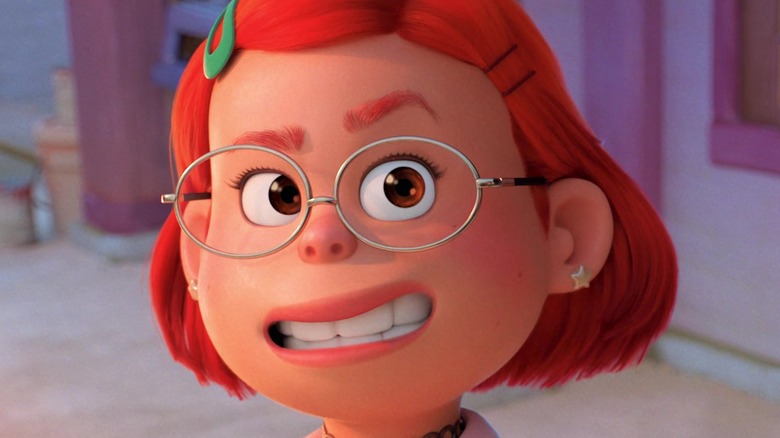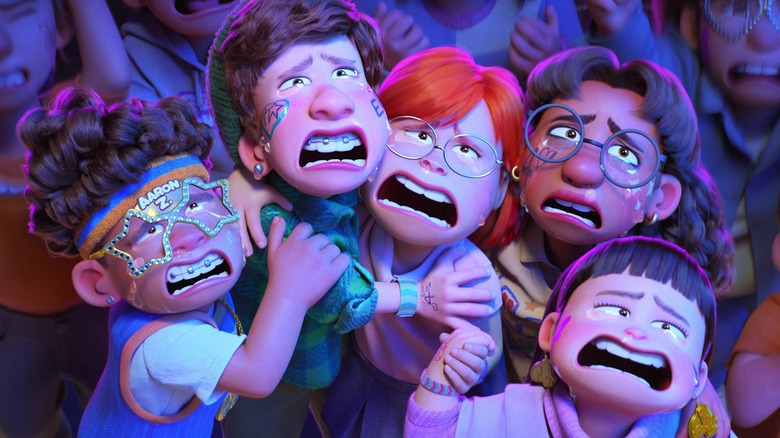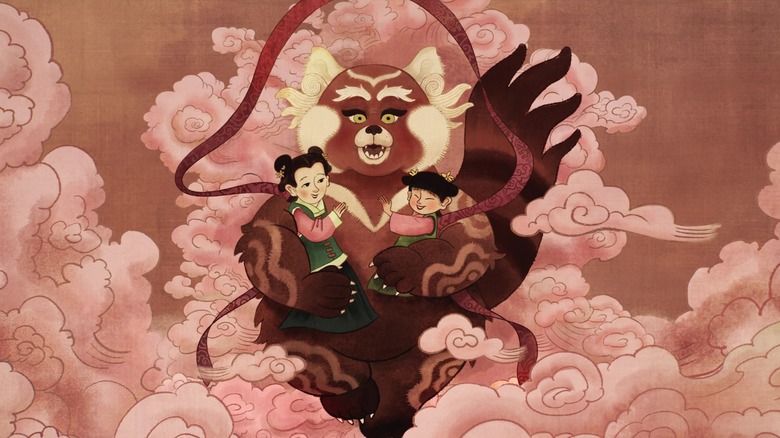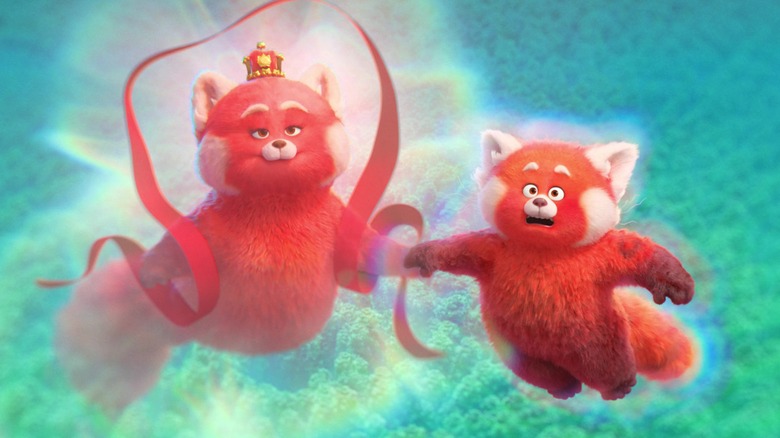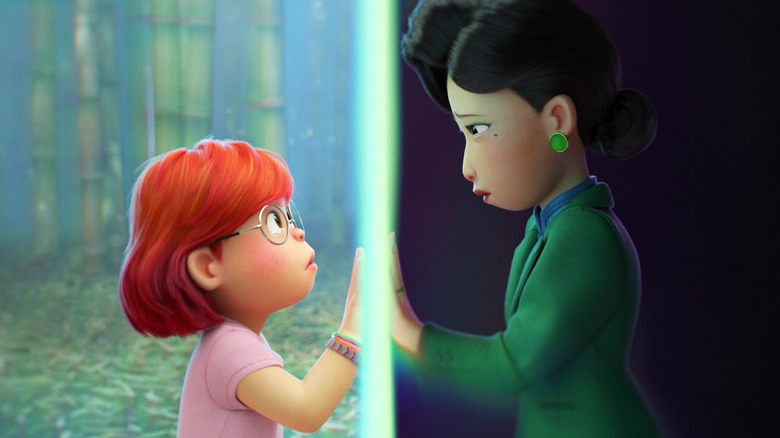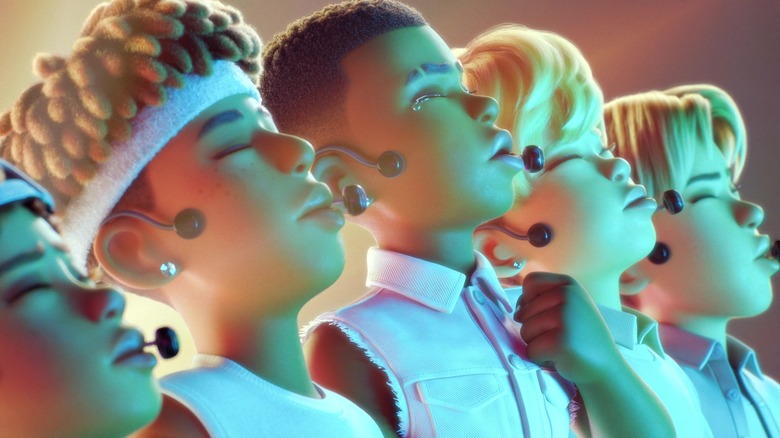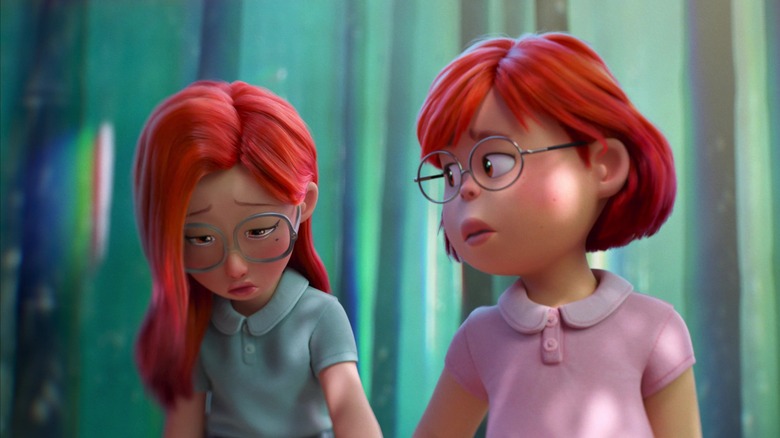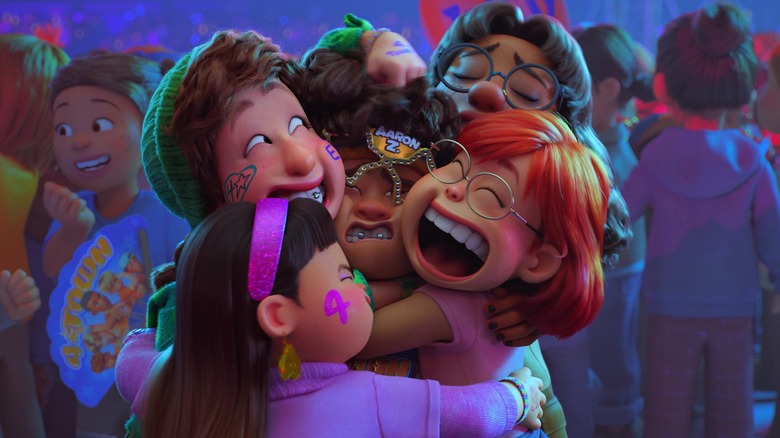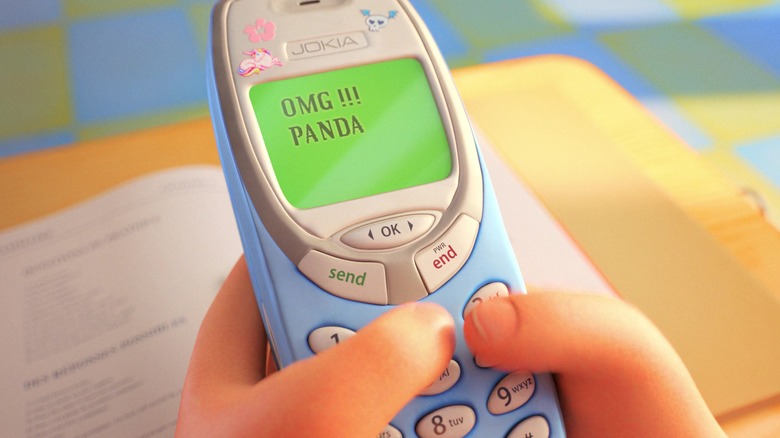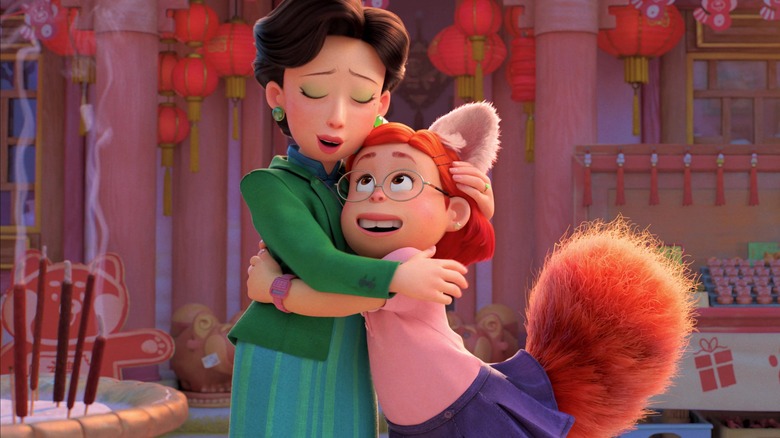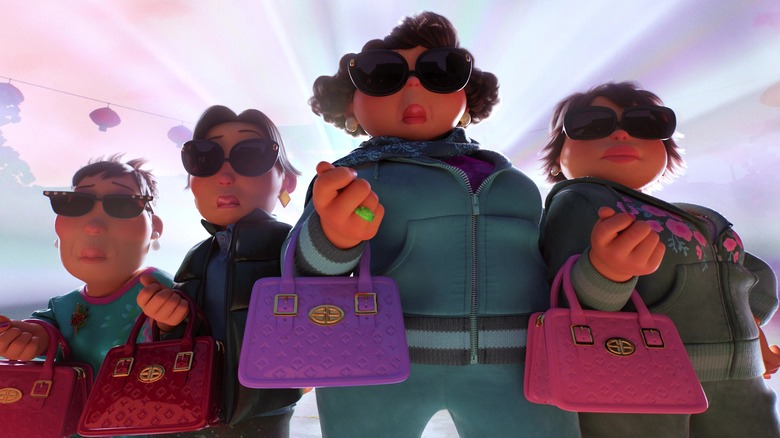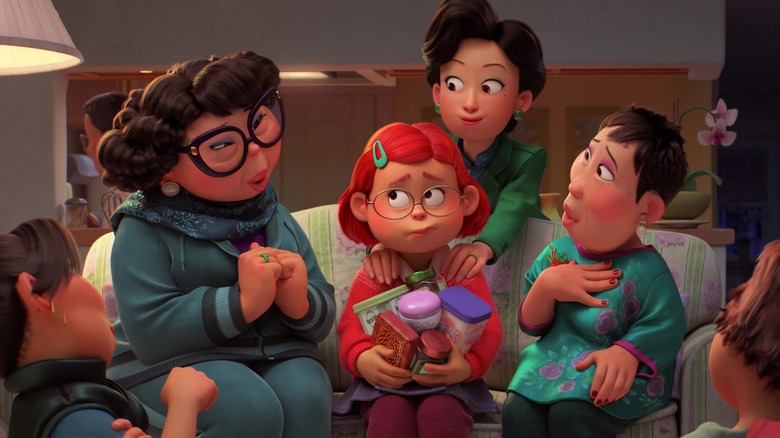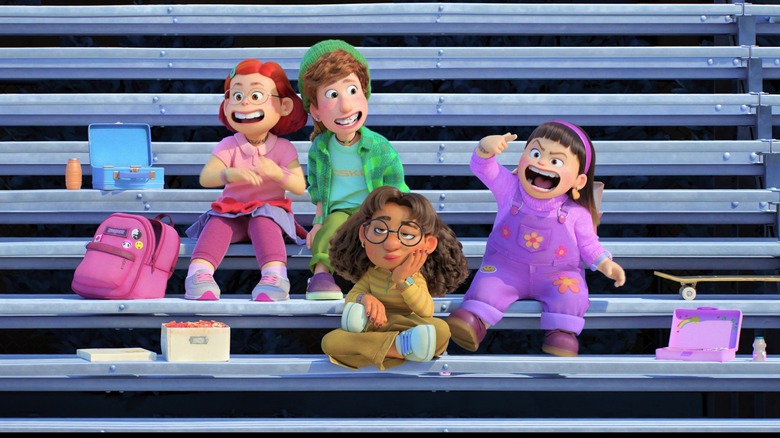The Ending Of Turning Red Explained
"Turning Red" ends with a kaiju fight in the Toronto SkyDome, a boy band harmony powerful enough to send people to the astral plane, and a tender reconciliation between a mother and daughter. While this sounds dizzying, the result is dazzling: You've never seen a coming-of-age movie quite like this. Mei is a 13-year-old girl who seems to have life figured out. Her grades are killer, her friends are amazing, and her mom is her rock — but one morning, she wakes up as an enormous red panda. As her mother explains, the women of Mei's family have endured this transformation, which is triggered by intense emotion, for centuries. It's awkward, cumbersome, and just plain weird — but luckily, they know how to seal the red panda spirit away. There's just one problem: Mei isn't so sure she wants to excise this bold new side of herself after all.
This dilemma crescendos in the colorful, hilarious, and deeply moving third act of "Turning Red." Much of its meaning is communicated through potent symbolism, especially that of the red panda — but what exactly does it all mean? Does the cuddly beast represent freedom, maturity, or something else entirely? How do Mei's grandmother and aunties factor in? And what the heck is up with 4*Town? We're here to explain the ending of "Turning Red," from its sugary pop songs to the true meaning of Mei's final choice.
The cringe will set you free
Mei is 13 years old, which means she is profoundly uncool. This is not a sneering judgment, but a simple fact — one that "Turning Red" enthusiastically embraces. Mei's the kind of kid who's jazzed about math homework, totes around a sticker-encrusted flute case, and proudly wears her Tamagotchi on her backpack strap. And then, of course, there is her devotion to 4*Town, the boy band that is the white-hot star around which her friend group orbits. Once Mei and her friends are finally able to attend the 4*Town concert they spend most of the movie saving up for, they burst into hysterical, snot-smeared sobs.
It's dweeby. It's dorky. It's positively cringe-worthy. And that's what makes it wonderful. Everything that makes Mei a high-octane geek is what makes her happy. In embracing this passion, symbolized by the red panda, she embraces her truest, most joyful self. Moreover, she's choosing genuine maturity, which rests upon firm self-acceptance rather than fleeting notions of what's cool. When Mei walks off into the Toronto sunshine with her squealing friends in the final scene, she's far more comfortable in her own skin than plenty of adults. It can take a lifetime to leave others' judgements behind — Mei's managed to get a head start before the end of middle school.
Tradition can hold you back
The women of Mei's family have been transforming into red pandas for generations. Unfortunately, as Mei's mother Ming points out, this is a tad inconvenient in a modern city like Toronto, where houses are squeezed right next to each other and warlords aren't in need of slaying. Thus, another tradition has emerged: Sealing the red panda away. Mei's mother, grandmother, and aunties have all undergone the necessary ritual, which confines the beast within to a brooch, pendant, or another small trinket.
While the red panda is framed as a pain in the butt, it's also an enormous part of Mei's family history, and the sealing has become a key rite of passage. Breaking with that sort of tradition is enormously difficult ... but sometimes, it has to be done. Mei chooses to forge a new path for her uniquely empowered family by eschewing the sealing ceremony and keeping her red panda spirit firmly inside her body. In doing so, she makes a major statement: Just because something has lasted doesn't mean it's justified. Moreover, she doesn't need to perfectly recreate tradition to be a proud member of her family — Sun Yee, Mei's legendary ancestor, literally embraces her after she makes her fateful choice. History can be a guide, but it can also be a shackle. Mei chooses to break hers.
New cultures, new traditions
Mei chooses to leave a major family tradition behind when she refuses to lock her red panda spirit away. But that doesn't mean she tosses her family's legacy entirely out the window — in fact, her choice puts her right in line with the generations of women who kept their red panda spirits squarely in their bodies, before her family immigrated to Canada. Yet it isn't exactly accurate to claim that Mei's decision is a return to an even older tradition than that of the sealing ceremony. Those ancestresses were motivated by vastly different forces, borne of a completely different world. Mei's choice mixes new and old into something unique: It's a tradition, remixed.
In embracing this, "Turning Red" ends with a powerful statement that holds special meaning for immigrant communities. The journey to a new world inevitably changes people and the cultures that shape them: Traditional clothes adjust to new climates, cuisine adapts to local ingredients, and, in Mei's case, the red panda becomes a party animal, rather than a violent defender meant for wartime. But what results isn't a pale imitation of an ancient tradition — it's a new manifestation of family history, whole unto itself. Mei is taking the red panda spirit into a new world, but the point is, she's taking it with her. No wonder Sun Yee is proud.
Mei's family steps into the future
When Mei's grandmother Wu gets wind of her red panda spirit's emergence, she quickly assembles the female members of their extended family. She arrives in Toronto at the head of a squad of aunties, each of whom sealed away their red panda spirit decades prior. They're old hands at the process, and tease Ming about the wrathful beast that once dwelled within her. But Mei's decision to keep her red panda spirit — a choice clearly rooted in joy, friendship, and honesty — casts their own paths into doubt. When they each re-seal their own red pandas away after the concert debacle, are they committing tragic acts of self-denial?
The truth is more complicated than that. Ming, Wu, and Mei's aunties might be okay with their choice. They might also be sad about it, now that Mei has shown them a new path. They might simply be disinterested in adjusting to a new, panda-fied way of life: Change is hard, especially when you're getting on in years. But none of that matters as much as the fact that they embrace Mei's choice, and in so doing, take a step forward. This is life in a nutshell, and one of the most potent messages the ending of "Turning Red" offers. You can't undo the past, but you can decide what to do in the present.
4*Town is a boy band of steel
When Mei introduces each member of the boy band behemoth that is 4*Town, the screen fills with bubbles, feathers, sparkles, and roses. They speak French! They foster injured doves! Incredibly convincing prop wings unfold from their back as they take to the Toronto SkyDome's stage! They're BTS, *NSYNC, and Menudo, all rolled into one dreamy package — and also, they have the grit and courage of a hardened phalanx of warriors.
When Ming, transformed into a skyscraper-sized red panda with terrifyingly scarlet eyes, attacks the SkyDome, the crowd flees. The five hunks of 4*Town are left dangling from wires, apparently abandoned by everyone behind the scenes. Do they collapse into uselessness? No: They get themselves down, dust themselves off, and reemerge atop a hill of rubble and stage equipment, harmonizing their hearts out for the sake of the ritual. These boys have no idea why a terrifying monster has attacked their performance, or why the heck these strangers need them to sing. But they aren't fazed: They sing, dance, and shed singular, crystalline tears. When people count down the toughest superheroes of 2022, they probably won't mention 4*Town. But those who've seen "Turning Red" know that these crush-worthy dreamboats could curbstomp the apocalypse just as soundly as any super-soldier.
Ming is trapped in a cycle of shame
There are many practical reasons to seal the red panda spirit away. As the transformation is triggered by intense emotion, Mei must always guard against too-high spirits — a tall order for a 13-year-old. Shedding is a reality her school's custodians probably don't love. Plus, Toronto buses simply aren't built for gigantic furry beasts. The red panda is, as Ming puts it, an inconvenience. But Ming doesn't want Mei to seal it away for purely pragmatic reasons. She's also motivated by anger and shame.
When Mei and Ming clash in the SkyDome, Mei protests that all she wanted to do was see her favorite band perform with her friends. Ming wrathfully retorts that she never got to go to concerts — she was too busy being the ideal daughter. Later, when Mei finds young Ming weeping in the forest, Ming admits she hurt her mother, presumably in her intensely emotional red panda form. The cycle of anger affecting Ming's judgment is clear: If she had to suffer, why should Mei get to escape? Compounding this is the shame she still feels for attacking her mother. This kind of emotional whirlpool can entrap families for decades, but when Ming accepts Mei's choice, she pulls them both free. Nothing can undo her past, but she can choose not to tie her daughter's future to it.
Forgiveness is worth it
For most of "Turning Red," Mei's classmate Tyler is kind of a jerk. He thinks she's a ridiculous dork, tapes copies of her swoony fan art all over school, and blackmails her into panda-ing out at his birthday party. But then, Mei and her friends spot him at the 4*Town concert, dressed head-to-toe in Aaron Z. gear. He's a 4*Townie just like them, and from that point on, they're friends. When Mei runs off into the Toronto sunshine alongside her buddies in the movie's final scene, Tyler is among their number.
"Turning Red" is about growing up in all its messiness. And while bullying shouldn't be tolerated, when Mei welcomes Tyler into her friend group, she acknowledges that part of adolescence is learning to forgive your similarly chaotic peers. Tyler, Mei, and all their friends are changing by the day, which means they're occasionally prone to making bad choices in their desperate efforts to appear cooler than they are. Tyler has responded to this intense stage of life with nastiness — but so has Mei, when she attacks him at his party. When she lets bygones be bygones, she accepts the process of growing up as the warts-and-all affair it truly is. Gaining a new friend with whom she can sob over boy bands is more important than hanging onto a grudge.
Millennials have taken the Hollywood helm
Nostalgic portraits of childhood are a long tradition in the entertainment industry. Netflix's "Stranger Things" offers Generation X a warm reminder of their '80s youth, while "Happy Days" took '70s viewers back to the '50s. Generally speaking, this fond approach hasn't touched the '00s — until now. As Millennial adults will notice, "Turning Red" never loses an opportunity to remind you that it's taking place in 2002, from Mei's chirping Tamagotchi to the chunky Nokia (sorry, "Jokia") phones her peers use to text each other crucial panda updates. 4*Town is perhaps the most overt nod to the Y2K era: This fictional fivesome's baggy jeans and rhythmic hand-claps put them firmly in line with *NSYNC rather than One Direction. And that's not even getting into the movie's "Simpsons" and "Twilight" Easter eggs.
This warm portrayal of the '00s makes one thing immediately clear: Millennials are well and truly grown-ups now, and they're ready to reexamine their own youths. Director Domee Shi falls squarely into this demographic – as she recounted to Elle Canada, she drew on her own two-decade-old memories of middle school for "Turning Red." What is perhaps even more interesting is the fact that the movie has earned dazzling reviews. The public isn't just ready for remembrances of the '00s, it's outright hungry for them. Buckle up, movie and TV fans: You're about to be hit with a wave of projects singing the praises of AOL Instant Messenger and low-rise jeans.
Mei and Ming lose something real
Mei takes immense pride in being her mother's little girl. Sunny snapshots of them singing together, wearing matching t-shirts, and enjoying an at-home spa day are literally the first things viewers see. It might be a little over-the-top, but the love is absolutely real — which is why the threat of losing it cuts so deeply. Mei feels herself changing in ways her mother won't approve of, but she's still desperate to remain by her side, just as a slightly different person. Thus, she slaps on a fake smile and pretends to be going to a Mathletes meeting instead of hanging out with her goofball friends. If her mom never knows, she can keep on being her darling daughter ... right?
Of course, the truth comes out. Mei and Ming's love proves to be strong enough to withstand the changes adolescence is bringing, but crucially, "Turning Red" validates their fears in its final moments. As Mei runs off with her friends, she admits that sometimes, she misses the way things used to be. What she feared has technically come to pass: She and her mother have lost some of their closeness, and it hurts. But accepting this fact is the only way Mei and Ming can move forward, and so they do. In acknowledging the loss at the heart of its ending, "Turning Red" becomes something greater than the sum of its parts: It becomes true.
Old ladies rule this world
Ming seems like the ruling power in Mei's life: It's no coincidence that when she and her friends are laying out their plan to make money for concert tickets, Ming is referred to as "the empress." But the minute Grandma Wu calls, Ming is just another freaked-out daughter begging her husband to say she's not there. She can't hide for long: Soon enough, Wu and Mei's aunties have arrived. They assemble outside the temple like a squad of mobsters, decked out in dark sunglasses. And why shouldn't they? By the end of "Turning Red," one thing is very clear: Old ladies rule this world.
Consider this: Wu knows Mei's red panda spirit has emerged mere hours after Ming does. As she expertly tweezes her eyebrows, we see she's watching footage of panda-Mei running across Toronto's rooftops. How has she accessed this recording? She lives in Florida before the age of viral videos, and this footage is never framed as causing the kind of media firestorm that would make it onto the American news, thousands of miles away. Then there's the mastery she and the aunties (and Mr. Gao) exhibit over the magical ritual. What else do they know? What kind of international contacts does Wu have? The icing on the cake is the fact that the film's ending reveals Sun Yee herself to be a regal old woman. "Turning Red" might be about Mei, but the world she's living in definitely belongs to Grandma.
Selflessness isn't always a good thing
Mei loves her family, and proves it in a thousand little (and not so little) ways. Every time she presents her mother with dazzling test scores, works in her family's temple, and even lies about her red panda-centric extracurricular activities, she's demonstrating how much she appreciates what her parents have done for her, and how eager she is to do them proud. But all these expressions of love depend on Mei's conformity to someone else's idea of who she should be. For a long time, this vision of perfection aligned with Mei's own goals. But now, she wants something else.
When Ming and Mei fight in the SkyDome, Ming shouts that she was a good daughter because she became someone other people wanted her to be. But that level of selflessness isn't goodness — it's complete self-denial. Dutiful daughterhood is not proven by a total erasure of one's own desires, especially when those desires are as simple as wanting to go to a concert. Because of this, Mei's decision to keep the red panda isn't just an act of expression, but one of basic self-determination: She must live for herself before she lives for anyone else. Happily, Ming comes to understand this in the bamboo forest, where she apologizes for making Mei feel she had to conform to her expectations.
Girls are people too
When Mei first transforms into a red panda, Ming assumes she's gotten her period. She's wrong, but definitely onto something: The red panda represents Mei's emerging adult personality. It's bold, energetic, aggressive, and funny — and according to Ming and generations before her, that isn't okay. She needs to lock it away as soon as possible, and return to being a perfect little lady.
The red panda doesn't just represent the menstrual cycle — it represents women's full, complex humanity. Historically, the world hasn't been too into this. Sealing the red panda away is a potent metaphor for the ways in which women have been shrunk by a world that isn't interested in them being just as weird, crass, and angry as they are sweet and helpful. But Mei knows that this unruly part of herself isn't something to be banished — it's something to be embraced. And eventually, Ming, Wu, Mei's aunties, and even Sun Yee herself (who has perhaps been waiting for this to happen for quite a while) know this too. After spending roughly 90 minutes celebrating the weird, wild, and wonderful world of middle school girlhood, "Turning Red" ends with Mei proudly sporting red panda ears, surrounded by her buddies. In doing so, it makes a statement as simple as it is powerful: Girls and women are people too — no more, no less.
